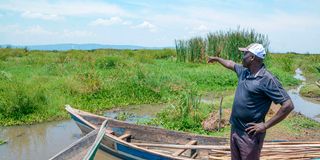Premium
Bound by calamity: The untold story of love, compassion in Nyando

Musa Ouko Oredo, 47, pointing at submerged homes in Nyando, Kisumu County on September 19, 2024.
Every flooding season in Nyando, Kisumu County, Musa Oredo’s modest one-and-a-half-acre piece of land is converted into an evacuation centre of some sort.
Families displaced by the flood waters have made it a habit to seek refuge at the homestead with the blessings of Mr Oredo. At the home, they even share their host’s little food.
During the peak of the flooding menace, every available space on the floor of Oredo's two-roomed house would be covered in mats and blankets belonging to the distressed families.
Behind the tales of the frequently oscillating twin disasters; floods and prolonged droughts, there is the untold story of solidarity, compassion and humanity as exhibited by the people of Nyando.
Whether they are faced with floods caused by River Nyando, the backflow of water from Lake Victoria or drought, community members draw their strength from their deep-rooted sense of unity in the face of adversity.
Whenever floods hit, it is usually a common sight seeing neighbours working hand in hand to evacuate marooned families besides salvaging their household items from the submerged homes.
No matter how powerful the forces of nature may be, the community strongly believes that nothing can break the bonds they have built over generations.
“When the waters rise or the earth dries, we stand together because that is how we survive,” said 23-year-old Edwin Ochieng from Kodumo village in Ugwe sub-Location.
Ochieng, who abandoned his one-acre piece of land to settle with his young family at the nearby Odega shopping centre after his house was submerged, is part of a group of young men in the village who have formed a rescue team that helps to evacuate vulnerable members of the community.
The rescue helps move the elderly, the sick, children and those with disabilities, to safe grounds whenever calamity strikes.
Ochieng and his colleagues usually ferry residents using makeshift rafts and canoes. But in some situations the volunteers are forced to physically carry the stranded villagers on their backs to safety.
For 73-year-old Mary Atieno, she owes her life to the swift action by the young rescuers who came to her aid when floodwaters caught her unawares in 2019.
Together with her ailing husband, they were ferried to the nearby Odega shopping centre.
In the rush of things, she only managed to carry her beddings and was lucky to be accommodated by a good Samaritan.
“When the floods came, they did not only think of saving themselves but they moved from one home to the next knocking on doors, making sure we were rescued,” said Atieno.
Those fortunate enough to have built their homes on higher grounds often open their gates to displaced families.
In these homes, no one is left out, regardless of how little space or resources may be available.
Having lost her entire five-acre piece of land to the waters, Atieno was rendered homeless. However, her misery was alleviated when Oredo offered her part of his land to erect a temporary structure.
When her husband succumbed to a kidney complication in 2020, Oredo freely donated a space for her to bury him.
“That is the space I had earmarked for my eldest son to build his home but I was touched by the circumstances that befell Atieno,” he said.
While she is happy to have found a new home, Atieno is still attached to her ancestral home where she previously buried her seven children.
“All this has been consumed by the lake water which has destroyed thousands of acres of farm under crop,” she says.
For those whose churches were swallowed up by the waters, the community has been forced to restrategise.
"We used to worship on Saturday but now some of us have been compelled to shift to Fridays because three churches are still under water and so we have no choice but to share the available places of worship,” she says.
Central Bwanda Assistant Chief Celine Oywa said Lake Victoria backflow had completely submerged Kabuto, Kalando Ugwe and Kajulu Ugwe out of the seven villages in her area of jurisdiction.
The local administrator pointed out that the destruction of farmlands had forced most residents to rely on humanitarian assistance from well-wishers.
“We have organisations like Red Cross, World Food Programme, the national and county governments which often come in to help people get back to their feet,” she says.
Her counterpart from Ugwe sub-Location George Ogada, who has witnessed firsthand the toll the disaster has taken on the people, said the raging calamity has affected over 450 households.
“My eight acres of land were also affected and I am currently being hosted by a well-wisher with my eight children,” he said.
For Nyando residents, the mantra, ‘united we stand, divided we fall’ has been their source of strength and survival.
Theres is a system that relies on kindness, generosity and selflessness with the understanding that what is shared today will come back in some form tomorrow.





